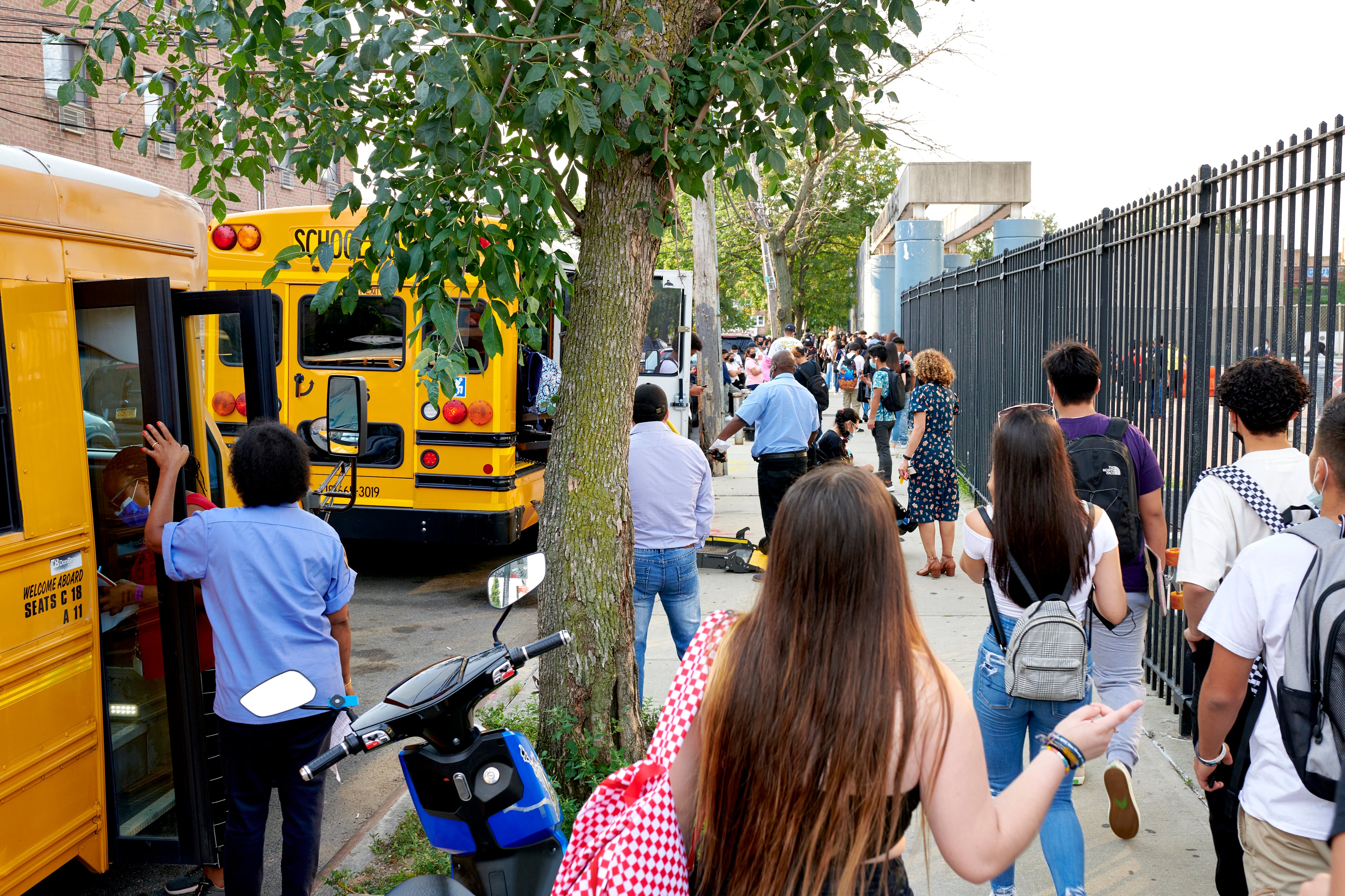Brooklyn mom Anjeanette Stokes noticed a few times last month that her daughter came home from summer school sweating and exhausted.
At first, Stokes attributed her daughter’s occasional overheated condition to the especially hot weather, but then her bus driver called last month and said their vehicle had no air conditioning. With few summer options options close to their Bay Ridge home, her daughter, an 8-year-old with Down syndrome, rides a yellow school bus for about an hour from P.S. 130 in Kensington each afternoon.
As an intense heat wave struck New York City last week, Stokes said she pulled her daughter out of school one day out of concern about the bus conditions. On another, her husband took their daughter to and from school using the city’s public buses, which are air conditioned. (Ordinarily, they take her to school only in the morning, as their pick up time is too early, Stokes said.)
“It made me really nervous that she was getting so overheated,” Stokes said.
School bus temperatures during the summer months have long been the subject of complaints, persisting in recent years as New York City has seen record levels of heat. Last week, as temperatures spiked to over 90 degrees, advocates say the heat became even more severe inside of school buses.
Roughly 47,000 students are riding yellow school buses this summer, according to Education Department officials. The buses primarily serve children with disabilities or those in temporary housing.
Under city law, air conditioning on school buses is required for students with disabilities whose individualized education programs, or IEPs, specify it for health reasons — a policy that has frustrated other families still concerned about the effect that heat could have on their children. City Council passed an amendment to the law in June to include all students with disabilities by 2035, the same year by which New York City plans to convert to a fleet of entirely electric school buses.
In the meantime, the extreme heat has led some parents, like Stokes, to face a difficult choice: Pull their kids out of summer programs on hot days, or risk potential health concerns. The issue became even more prevalent last week, said Rima Izquierdo, a Bronx parent and advocate, as city officials urged New Yorkers to remain cool and hydrated amid a National Weather Service excessive heat warning.
“I have parents texting me pictures of the NYC warnings being like, ‘What do I do with my kid?’” she said. “And I’m like, ‘Do what you need to do. Do what you need to do — because if something happens to your kid, you gotta live with that.’”
Izquierdo said her kids have come home dripping with sweat every summer for more than a decade.
As a PTA president at P176X in Co-op City, a District 75 school serving children with disabilities, Izquierdo now conducts bus temperature checks at the campus every year, including a trip last week that found temperatures on some buses reached more than 100 degrees. Multiple buses they inspected did not have working air conditioning, said Tom Sheppard, a member of the city’s Panel for Educational Policy who accompanied Izquierdo that day.
One bus, Sheppard said, had an internal temperature of roughly 110 degrees.
Education Department spokesperson Jenna Lyle said more than 90% of buses used for summer transportation are equipped with air conditioning.
“Any student who is mandated to have air conditioning on their school bus is transported on a bus equipped with air conditioning,” she said in an email.
“Access to air conditioning on buses will be a priority as we move forward,” she added.
Sheppard said the city should take steps to ensure every bus has air conditioning during the summer, adding if even 10% lack air conditioning, it could pose health concerns.
“If we’ve got thousands of buses on the road, that means we’ve got hundreds of hot ones,” he said. “That’s a lot of opportunity for our young people to have heat related issues.”
Some complaints get traction
Sara Catalinotto, founder of Parents to Improve School Transportation, said some parents have had success advocating for their students to get onto buses with air conditioning, but added not all parents know where to go or that an IEP can include an air conditioned bus.
“A lot of parents don’t know their rights. They don’t know these channels of communication,” she said. “And really, it should be prevented. It shouldn’t really have to be such a struggle.”
Education Department officials said they address cases where air conditioning is not required by an IEP on an individual basis, and place air conditioned buses on routes wherever possible.
Stokes, the Bay Ridge parent, complained to the Education Department’s Office of Pupil Transportation, or OPT, early last week. The situation was resolved by Friday, and her daughter now has a bus with air conditioning. But she remains shocked it is only required for students whose IEPs mandate it, especially when it didn’t come up in any of her daughter’s IEP meetings.
“To me, that’s like saying, you need to have access to a water fountain on your IEP,” she said.
And while Izquierdo, too, said she’s been able to resolve some individual cases through contacting OPT, she expressed frustration with the long timeline toward a broader change. Each summer, she said, her phone rings non-stop with concerns from parents at her school. She worries that little will change before the new law goes into effect in 2035.
“It shouldn’t take 12 years,” she said.
Julian Shen-Berro is a reporter covering New York City. Contact him at jshen-berro@chalkbeat.org.






